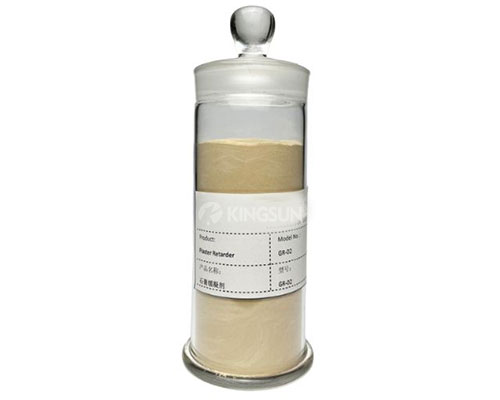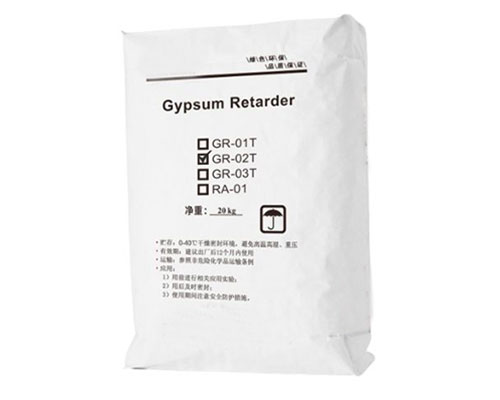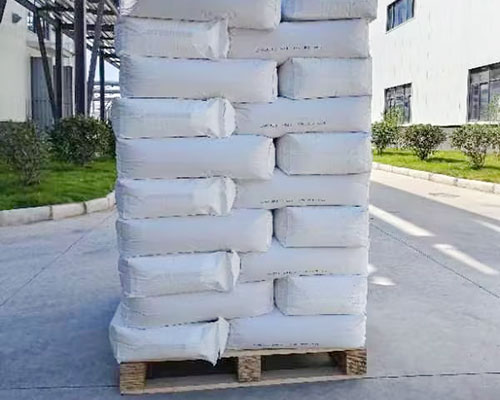- Product Name: Plaster Retarder
- Alternative name: Gypsum Retarder
- Appearance: yellow powder
- Applications: gypsum base self-leveling, caulking gypsum
, gypsum plastering mortar, plastering gypsum, plasterboard, gypsum components, gypsum binder, gypsum putty, gypsum block, geramic model - Packaging: 25kg paper bag
Plaster retarder, also known as gypsum retarder, is mainly used for gypsum building materials such as plastering gypsum, bonding gypsum, gypsum putty, and gypsum products. Their main function is to reduce the setting speed of gypsum. At present, there are three main types of gypsum retarders commonly used (such as organic acids and their soluble salts, alkaline phosphates, and proteins). GR-02 gypsum plaster retarder for sale in our company is a highly efficient protein-based gypsum retarder powder. Only a small amount is needed to keep the fluidity of gypsum in an excellent state. It can significantly prolong the setting time of gypsum without adverse effects on strength. This product can be dry-mixed with other admixtures and gypsum materials, and its performance will not change even after long-term storage. It is suitable for gypsum-based self-leveling, gypsum plaster mortar, gypsum board and other systems that need to control the setting time.
| Detection index | Value |
| Appearance | Yellow powder |
| Bulk density(kg/m3) | |
| PH value(10% in water) | 10-12 |
| Retarding time (0.1%@gypsum) min | 120 |
| Storage | No more than 12 months under condition 5-35°C, dry and cool. Prevent direct sunlight, moisture and be pressed for caking. When it is more than 12 months, it still could be used if there is no caking. |
What is Protein-based Plaster Retarder
Protein gypsum retarder is an additive commonly used in the production of gypsum products. Its main component is protein. Protein has a good retarding effect. Before solidification, it can adsorb gypsum mineral particles in water on its surface to form a colloid, which can effectively control the solidification speed and viscosity of gypsum and improve the quality of gypsum products.
-
Mechanism Action of Protein Gypsum Retarder
- Application Fields
The main function of protein-based gypsum retarder is to delay the hydration and hardening process of gypsum, thereby prolonging the setting time of gypsum. It reacts with sodium ions in gypsum to produce a slow solidification effect. This slow solidification process can improve the quality and strength of gypsum products, while prolonging the fluidity of gypsum and making the products more uniform. In addition, protein-based retarders can also delay the hydration and hardening process of gypsum, so that the gypsum slurry can maintain plasticity for a longer time, thereby realizing flexible regulation of the setting time.
Protein-based plaster retarder is widely used in the construction industry, mainly used to make various gypsum products such as gypsum boards, gypsum lines, and gypsum sculptures. These products are more durable and more beautiful because of the effect of retarders. In addition, protein-based gypsum plaster retarders are also commonly used in the production of gypsum building materials such as plaster, bonding gypsum, and gypsum putty, providing strong support by reducing their hydration rate. In practical applications, the dosage can be adjusted according to the needs of specific products to achieve the best retarding effect and gypsum quality.
Why Choose Protein-based Gypsum Plaster retarders
First, we need to understand the mechanism action of the three commonly used plaster retarders.
Citric acid retarders. The molecular structure of citric acid contains hydroxyl groups and polycarboxylic acids, which can react with calcium elements on the surface of gypsum to form a stable calcium citrate complex. This complex is adsorbed on the hemihydrate gypsum particles, reducing the supersaturation of the liquid phase, thereby slowing down the rate of crystal nucleation and achieving a retarding effect. In addition, complexes with different bonding forms and binding energies will lead to different crystal growth rates, which in turn affects the macroscopic properties.
Polyphosphoric acid retarders. Its mechanism action is that it can significantly affect the various stages of the gypsum hydration process, including the induction period, crystallization period, and conversion period. This effect not only prolongs the setting time, but also leads to a significant decrease in strength. Therefore, when selecting and using retarders, it is necessary to fully consider their impact on macroscopic properties.
Protein gypsum plaster retarders are stable and easy to control in regulating setting time, while having little effect on strength, so they show significant advantages in actual production.
 Plaster Retarder GR-02
Plaster Retarder GR-02 Kingsun plaster retarder
Kingsun plaster retarder Gypsum retarder in pallet
Gypsum retarder in pallet
- Product Name: Plaster Retarder
- Alternative name: Gypsum Retarder
- Appearance: yellow powder
- Applications: gypsum base self-leveling, caulking gypsum
, gypsum plastering mortar, plastering gypsum, plasterboard, gypsum components, gypsum binder, gypsum putty, gypsum block, geramic model - Packaging: 25kg paper bag
Plaster retarder, also known as gypsum retarder, is mainly used for gypsum building materials such as plastering gypsum, bonding gypsum, gypsum putty, and gypsum products. Their main function is to reduce the setting speed of gypsum. At present, there are three main types of gypsum retarders commonly used (such as organic acids and their soluble salts, alkaline phosphates, and proteins). GR-02 gypsum plaster retarder for sale in our company is a highly efficient protein-based gypsum retarder powder. Only a small amount is needed to keep the fluidity of gypsum in an excellent state. It can significantly prolong the setting time of gypsum without adverse effects on strength. This product can be dry-mixed with other admixtures and gypsum materials, and its performance will not change even after long-term storage. It is suitable for gypsum-based self-leveling, gypsum plaster mortar, gypsum board and other systems that need to control the setting time.
| Detection index | Value |
| Appearance | Yellow powder |
| Bulk density(kg/m3) | |
| PH value(10% in water) | 10-12 |
| Retarding time (0.1%@gypsum) min | 120 |
| Storage | No more than 12 months under condition 5-35°C, dry and cool. Prevent direct sunlight, moisture and be pressed for caking. When it is more than 12 months, it still could be used if there is no caking. |
What is Protein-based Plaster Retarder
Protein gypsum retarder is an additive commonly used in the production of gypsum products. Its main component is protein. Protein has a good retarding effect. Before solidification, it can adsorb gypsum mineral particles in water on its surface to form a colloid, which can effectively control the solidification speed and viscosity of gypsum and improve the quality of gypsum products.
-
Mechanism Action of Protein Gypsum Retarder
- Application Fields
The main function of protein-based gypsum retarder is to delay the hydration and hardening process of gypsum, thereby prolonging the setting time of gypsum. It reacts with sodium ions in gypsum to produce a slow solidification effect. This slow solidification process can improve the quality and strength of gypsum products, while prolonging the fluidity of gypsum and making the products more uniform. In addition, protein-based retarders can also delay the hydration and hardening process of gypsum, so that the gypsum slurry can maintain plasticity for a longer time, thereby realizing flexible regulation of the setting time.
Protein-based plaster retarder is widely used in the construction industry, mainly used to make various gypsum products such as gypsum boards, gypsum lines, and gypsum sculptures. These products are more durable and more beautiful because of the effect of retarders. In addition, protein-based gypsum plaster retarders are also commonly used in the production of gypsum building materials such as plaster, bonding gypsum, and gypsum putty, providing strong support by reducing their hydration rate. In practical applications, the dosage can be adjusted according to the needs of specific products to achieve the best retarding effect and gypsum quality.
Why Choose Protein-based Gypsum Plaster retarders
First, we need to understand the mechanism action of the three commonly used plaster retarders.
Citric acid retarders. The molecular structure of citric acid contains hydroxyl groups and polycarboxylic acids, which can react with calcium elements on the surface of gypsum to form a stable calcium citrate complex. This complex is adsorbed on the hemihydrate gypsum particles, reducing the supersaturation of the liquid phase, thereby slowing down the rate of crystal nucleation and achieving a retarding effect. In addition, complexes with different bonding forms and binding energies will lead to different crystal growth rates, which in turn affects the macroscopic properties.
Polyphosphoric acid retarders. Its mechanism action is that it can significantly affect the various stages of the gypsum hydration process, including the induction period, crystallization period, and conversion period. This effect not only prolongs the setting time, but also leads to a significant decrease in strength. Therefore, when selecting and using retarders, it is necessary to fully consider their impact on macroscopic properties.
Protein gypsum plaster retarders are stable and easy to control in regulating setting time, while having little effect on strength, so they show significant advantages in actual production.
 Plaster Retarder GR-02
Plaster Retarder GR-02 Kingsun plaster retarder
Kingsun plaster retarder Gypsum retarder in pallet
Gypsum retarder in pallet
- Product Name: Plaster Retarder
- Alternative name: Gypsum Retarder
- Appearance: yellow powder
- Applications: gypsum base self-leveling, caulking gypsum
, gypsum plastering mortar, plastering gypsum, plasterboard, gypsum components, gypsum binder, gypsum putty, gypsum block, geramic model - Packaging: 25kg paper bag
Plaster retarder, also known as gypsum retarder, is mainly used for gypsum building materials such as plastering gypsum, bonding gypsum, gypsum putty, and gypsum products. Their main function is to reduce the setting speed of gypsum. At present, there are three main types of gypsum retarders commonly used (such as organic acids and their soluble salts, alkaline phosphates, and proteins). GR-02 gypsum plaster retarder for sale in our company is a highly efficient protein-based gypsum retarder powder. Only a small amount is needed to keep the fluidity of gypsum in an excellent state. It can significantly prolong the setting time of gypsum without adverse effects on strength. This product can be dry-mixed with other admixtures and gypsum materials, and its performance will not change even after long-term storage. It is suitable for gypsum-based self-leveling, gypsum plaster mortar, gypsum board and other systems that need to control the setting time.
| Detection index | Value |
| Appearance | Yellow powder |
| Bulk density(kg/m3) | |
| PH value(10% in water) | 10-12 |
| Retarding time (0.1%@gypsum) min | 120 |
| Storage | No more than 12 months under condition 5-35°C, dry and cool. Prevent direct sunlight, moisture and be pressed for caking. When it is more than 12 months, it still could be used if there is no caking. |
What is Protein-based Plaster Retarder
Protein gypsum retarder is an additive commonly used in the production of gypsum products. Its main component is protein. Protein has a good retarding effect. Before solidification, it can adsorb gypsum mineral particles in water on its surface to form a colloid, which can effectively control the solidification speed and viscosity of gypsum and improve the quality of gypsum products.
-
Mechanism Action of Protein Gypsum Retarder
- Application Fields
The main function of protein-based gypsum retarder is to delay the hydration and hardening process of gypsum, thereby prolonging the setting time of gypsum. It reacts with sodium ions in gypsum to produce a slow solidification effect. This slow solidification process can improve the quality and strength of gypsum products, while prolonging the fluidity of gypsum and making the products more uniform. In addition, protein-based retarders can also delay the hydration and hardening process of gypsum, so that the gypsum slurry can maintain plasticity for a longer time, thereby realizing flexible regulation of the setting time.
Protein-based plaster retarder is widely used in the construction industry, mainly used to make various gypsum products such as gypsum boards, gypsum lines, and gypsum sculptures. These products are more durable and more beautiful because of the effect of retarders. In addition, protein-based gypsum plaster retarders are also commonly used in the production of gypsum building materials such as plaster, bonding gypsum, and gypsum putty, providing strong support by reducing their hydration rate. In practical applications, the dosage can be adjusted according to the needs of specific products to achieve the best retarding effect and gypsum quality.
Why Choose Protein-based Gypsum Plaster retarders
First, we need to understand the mechanism action of the three commonly used plaster retarders.
Citric acid retarders. The molecular structure of citric acid contains hydroxyl groups and polycarboxylic acids, which can react with calcium elements on the surface of gypsum to form a stable calcium citrate complex. This complex is adsorbed on the hemihydrate gypsum particles, reducing the supersaturation of the liquid phase, thereby slowing down the rate of crystal nucleation and achieving a retarding effect. In addition, complexes with different bonding forms and binding energies will lead to different crystal growth rates, which in turn affects the macroscopic properties.
Polyphosphoric acid retarders. Its mechanism action is that it can significantly affect the various stages of the gypsum hydration process, including the induction period, crystallization period, and conversion period. This effect not only prolongs the setting time, but also leads to a significant decrease in strength. Therefore, when selecting and using retarders, it is necessary to fully consider their impact on macroscopic properties.
Protein gypsum plaster retarders are stable and easy to control in regulating setting time, while having little effect on strength, so they show significant advantages in actual production.


